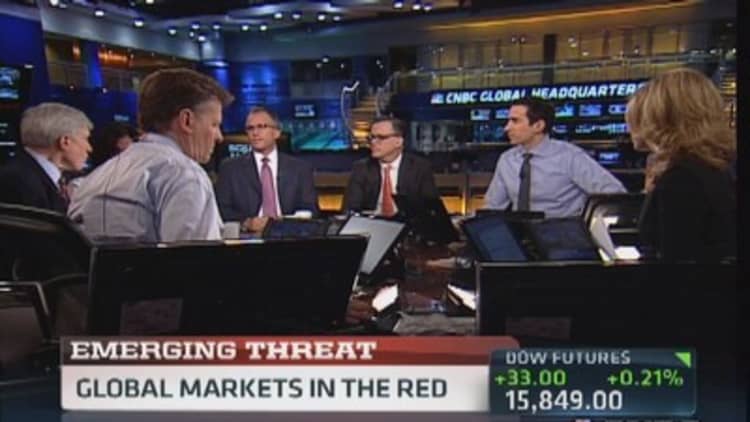
The ongoing concerns about emerging markets could end up boosting U.S. stocks as investors look for greener pastures, BMO's Brian Belski told CNBC on Monday.
Belski, chief investment strategist at BMO Capital Markets, said the jitters that caused ripples across global stock markets last week stem from a redeployment of cash between emerging markets and the next investment opportunity. As currencies in emerging markets such as Argentina, Turkey and South Africa continue to falter, the U.S. stock market could be the next best option for investors, he said.
"That's why people are freaking out," Belski said on "Squawk Box." "When you think about asset cycles, the last cycle was driven by credit. The current investment cycle has been driven by cash. … Which companies in the world have the strongest balance sheets in cash? It's America."
(Read more: Are emerging markets on brink of another crisis?)
Ongoing concerns about emerging markets, in China and elsewhere, could end up boosting U.S. stocks as investors look for greener pastures, BMO's Brian Belski told CNBC on Monday.
Belski, chief investment strategist at BMO Capital Markets, said the jitters that caused ripples across global stock markets last week stem from a redeployment of cash between emerging markets and the next investment opportunity. As currencies in emerging markets such as Argentina, Turkey and South Africa continue to falter, the U.S. stock market could be the next best option for investors, he said.
"That's why people are freaking out," Belski said on "Squawk Box." "When you think about asset cycles, the last cycle was driven by credit. The current investment cycle has been driven by cash. … Which companies in the world have the strongest balance sheets in cash? It's America."
Michael Purves, chief global strategist at Weeden & Co., agreed that the ongoing worries over emerging market currencies could bode well for U.S. equities.
Multinational companies that do large amounts of business in developing countries, however, could have trouble if those nations continue to appear unstable, he said.
(Read more: Despite selloff, Fed fears, don't worry: Economists)
"What's bad for emerging markets could be very good for U.S. equities looking into 2014," Purves told CNBC. "If you want to buy emerging market equities, look to currencies first. And the currencies are telling you a pretty ugly story right now."
The redeployment of cash from emerging markets to developed economies should also generate stronger job growth, said Robert Hormats, a vice chairman at Kissinger Associates. Hormats cited news that Foxconn, Apple's chief manufacturer, was eying the United States as a potential location for one of its high-tech manufacturing plants.
"When you see Foxconn coming in here, that's a signal of something," Hormats told CNBC. "We're going to see big job increases from Chinese investment and other parts of East Asia that want to be in this market."
(Read more: Outsourced Apple supplier to bring factory back to US)
Emerging markets have been a hot item in portfolios for the past 10 years, Belski said. It may take three to five years for investors to "unwind" their positions from them, he said.
"People aren't here yet," Belski said. "The private client is not here. The emerging market client is not here. Europe is a very reluctant buyer of America. They're still chasing European stocks. The biggest surprise of this year could be that the U.S. continues to outperform."
—By CNBC's Jeff Morganteen. Follow him on Twitter at @jmorganteen.


